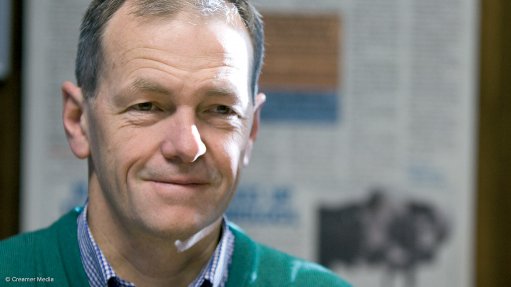
Teba MD Graham Herbert
Photo by: Duane Daws
JOHANNESBURG (miningweekly.com) – The long-standing Teba Limited business, which recruits and manages local and foreign labour for South Africa’s mining industry, has changed its approach from being an inward-looking company to one that proactively provides various services to mines, mineworkers and their families.
At a media briefing in Johannesburg, on Wednesday, Teba executive chairperson Dr James Motlatsi and MD Graham Herbert explained the impetus and rationale for a change process that meant more than a new brand and position in the marketplace.
“Teba, as it will be known going forward, recognised itself as an established stakeholder in the mining industry and will, therefore, become bolder publicly in terms of its thought leadership and opinions, enabling it to tell its stories, as simple as they may be, and have the impact [of its service offering] recognised,” said Herbert.
Teba’s services – in the main – while critical, have hardly been attention-grabbing in the past, he acknowledged.
For example, Teba planned to share with the media stories, such as how a mineworker’s widow, who had struggled with poverty for decades, unable to access benefits owing to her, had finally been helped by Teba to complete the necessary paperwork and receive her dues.
Herbert highlighted two events in particular – the Marikana massacre and the five-month strike in the platinum sector – that had brought sharply into focus the plight of communities of people associated with the mining industry, directly and indirectly, their frustration, and the need for workable solutions and meaningful change.
The challenges experienced by the mineworkers ranged from financial – for example, making sure money flows smoothly from mineworkers to their families living in rural areas throughout Southern Africa – to health – taking care of mineworkers, ex-mineworkers and their families, stricken by HIV/Aids, tuberculosis and silicosis, or permanent, disabling work-related injuries.
Herbert said Teba had tried-and-tested, affordable solutions to overcome many of the socioeconomic challenges facing the mining industry and mineworkers.
“It is incumbent on us – both as a revenue-generating business and as an established stakeholder – to ensure these solutions are recognised and applied more intensively,” he told the media.
“We have long held the view – and more recently have voiced these strongly – that simply ending the migrant labour system is neither doable nor desirable; rather, that with consultation and resulting adjustment, more jobs and vastly improved lifestyles for migrant mineworkers and their families are a real possibility,” he added.
Teba’s service offering, which is focused on providing workable solutions and demand-led needs, includes job readiness and recruitment services, work life solutions and community development projects.
Also part of Teba’s growing service offering was the new shift arrangement it was piloting with gold miner Sibanye Gold, which was aimed at eliminating the migrant labour system in its present form. Teba was also piloting a cashless incremental home loan service and was linking integrated development plans with social and labour plans.
With more than 600 employees in the field, working from a network of more than 100 offices, Teba has witnessed the often-unanticipated consequences of joblessness, illness, injury and oversight among mineworkers, ex-mineworkers and their families.
While mines, mineworkers, ex-mineworkers and their families were close to Teba’s core – and were likely to remain so – the company had come to realise that its offerings to these clients were also relevant and should be as attractive to large-scale employers, their employees, former employees and their dependents in other sectors, Herbert pointed out.
The company would consider its options in some of these sectors, including heavy industry, agriculture, manufacturing, construction, textiles and the public sector.
“In the past, we saw our mission as serving mines and mineworkers; now, it is more about unlocking human potential wherever we find it,” said Herbert.